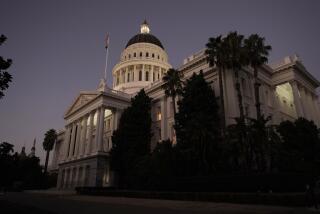Tribal Restaurants Will Be Exempted From Sales Taxes
SACRAMENTO — The state board that oversees tax policy has ruled that Indian tribes no longer are required to collect state and local sales taxes on their restaurant sales--inspiring the head of the California Restaurant Assn. to say he may seek relief for restaurants not on reservations.
The Board of Equalization, an elected body, overruled its staff and concluded that the state should drop its long-held policy of trying to collect the taxes, which last year could have amounted to an estimated $16 million on sales of about $200 million--if the state had received all the money.
Most tribes, citing their status as sovereign entities, have refused to collect state and local sales taxes, which average 7.9% statewide. Several have sued or been sued by the state over the issue. Board of Equalization members say they wanted to settle the matter once and for all.
“There is no revenue loss because we never collect it,” said board member Dean Andal, who pressed for the change, approved Wednesday without dissent.
“It saves the state money in the long run by not having litigation costs and by us not having to do audits,” said board member Johan Klehs.
The board’s decision to overturn the regulation that had been in effect since 1978 is the latest illustration of the tribes’ growing political influence, said Glenn M. Feldman, who represented the Cabazon tribe in Riverside County, the Viejas and San Pascual tribes in San Diego County, and the Santa Inez tribe in Santa Barbara County.
“Tribes, particularly in California, have a much better relationship with all levels of the political process than they did five or 10 years ago,” Feldman said. “They have access. It is a very different world than it was five or 10 years ago, when they could not get through the front door.”
In past years, attorneys representing Indians said, tribes would have spent years battling the board in court fights. More recently, however, several of the state’s tribes, enriched by rapidly growing gambling operations, have become the largest campaign donors in California.
Andal, a Republican, and Klehs, a Democrat, who are seeking their parties’ nominations for state controller, said the tribes’ lobbyists did not contact them about the issue. Rather, Andal said he suggested the change on his own. Lawyers for several tribes appeared at the board hearing when members took their vote, and representatives of the California Nations Indian Gaming Assn., representing 74 of the state’s 109 recognized tribes, sent a letter urging the change.
The state will publish regulations making the tax change final in mid-2002. Until then, board auditors probably will stop enforcing the old requirement, Andal said.
The Board of Equalization, seeking to collect unpaid sales taxes, threatened in 1997 to suspend the liquor license held by the Agua Caliente Band of Cahuilla Indians. The tribe, which operates restaurants and casinos in Palm Springs, sued.
Earlier this month, U.S. District Judge Manuel Real in Los Angeles concluded that the Board of Equalization could impose a use tax on poured liquor, but not on prepared food in restaurants and bars of a hotel owned and operated by the tribe and located on its reservation. The board’s action probably will make the lawsuit moot.
The decision does not mean that patrons will cease paying taxes on food and drinks. Several tribes impose taxes that are equivalent to state and local sales taxes. Attorney Lester Marston, representing the Chemehuevi tribe near Lake Havasu, said tribal sales taxes will be used to finance bonds for public works projects on the reservation.
“This opens up a whole new revenue source,” Marston said.
An analysis prepared by the Board of Equalization staff estimated that tribal restaurant and bar sales total $200 million annually, a sum that almost certainly will rise as more tribes open larger casinos.
If state and local governments collected sales taxes on $200 million, annual receipts would be almost $16 million. As it turns out, however, the state collects roughly $2.9 million annually in sales taxes from tribal restaurants and bars, the board’s analysts say. By contrast, the statewide restaurant industry has sales of $40 billion and pays roughly $2.8 billion in sales taxes.
In opposing any change, the board’s staff analysis noted “concerns that Indian tribes are gaining a significant competitive advantage over non-Indian retailers engaging in the same types of commercial activities.”
Card club operators already have sued to overturn a ballot measure approved by voters last year that grants tribes monopoly rights to operate Nevada-style casinos in California.
John Dunlap, president of the California Restaurant Assn., said the Board of Equalization’s action “is a step in the right direction.”
“That food tax is regressive,” Dunlap said. “We’re going to discuss looking at ways to expand it [for other restaurants] that might make sense.”
Dunlap stopped short of saying he would seek a repeal of sales taxes on food prepared at restaurants. But in his view, the state Constitution, which bars sales taxes on groceries, makes no distinction for food and drinks prepared at restaurants.
“This has piqued our interest,” Dunlap said. “We’re going to put on our strategic thinking caps. . . . I’ve got to tell you, there are a lot of marginal restaurants that are going out of business. We’re going to look at reform.”
Klehs, for one, was unimpressed.
“The legislative session starts in January. He knows where the Capitol is,” Klehs said.
More to Read
Inside the business of entertainment
The Wide Shot brings you news, analysis and insights on everything from streaming wars to production — and what it all means for the future.
You may occasionally receive promotional content from the Los Angeles Times.









